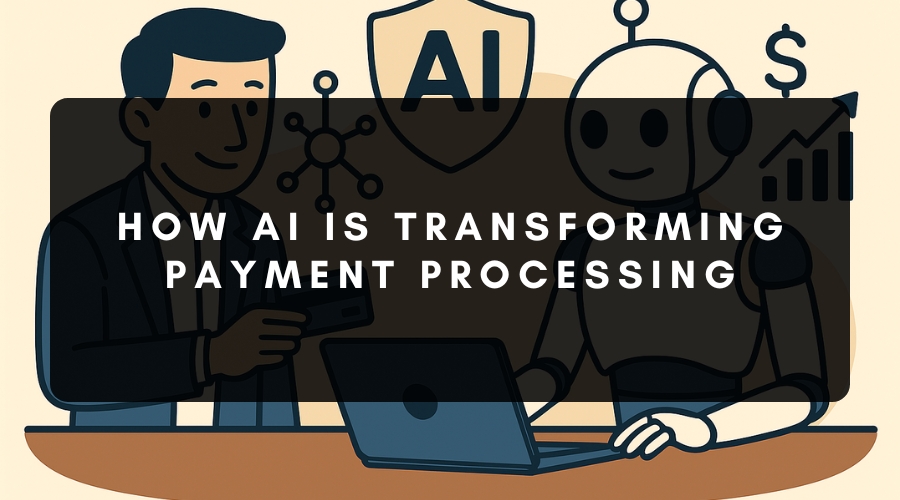
How AI Is Transforming Payment Processing
The payment industry is going through a transformation as AI changes the way businesses conduct many of their core processes, including payments. Digital payments are becoming ubiquitous, leading organisations and consumers to ask for quicker, more seamless, secure, and personalised payments.
AI has become an influential force supporting organisations in enhancing their payment processing capabilities, strengthening fraud detection, and improving the payment experience for everyone involved.
1. More Accurate Fraud Detection and Prevention
One of the greatest advances for payment data with artificial intelligence has been its ability to flag potentially fraudulent transactions accurately. AI fraud detection substantially decreases false declines, the process in which a good transaction is denied.
Traditional fraud prevention systems utilise hardcoded rules to block suspicious transactions. AI systems assess fraud risk by evaluating numerous data points, such as geolocation, device ID, and user behaviour. By using predictive analytics and machine learning algorithms, AI assigns dynamic risk scores to each transaction and decides whether to let each one go through.
Example: A Swiss customer, Marie, typically purchases a skincare company’s 720 ml hand cream once a month for €20. When she travels to Morocco for a year and starts making these purchases from a different location, the AI risk assessment system lets the transaction through because it recognises her user behaviour as typical. Traditional fraud detection software may have blocked the transactions based on the change of location alone.
2. Personalised Payment Experiences at Scale
Consumers expect seamless and intuitive payment experiences. AI makes this possible by delivering personalised payment options at the checkout based on a user’s behaviour, preferences, and financial standing.
For instance, AI can suggest instalment plans for high-value transactions, recommend payment methods based on previous usage, or even alert users when their account balance is low. With AI built into checkout experiences, cart abandonment rates are reduced because the process is smoother and faster.
AI-powered software tools can also e-mail customers automatically about their abandoned cart and include a personalised offer if they complete the purchase within a certain timeframe (48 hours, for example). It adds personalisation to recommendations and provides real-time support.
By offering personalised interactions around their online payment processing systems, businesses increase customer engagement and build long-term customer loyalty.
3. AI Improves Profitability
AI in payment processing significantly improves operational cost efficiencies for e-commerce business owners. It does this by automating routine tasks such as fraud detection, transaction approval, and customer verification.
This reduces the need for manual oversight, minimises the chance of human error, and accelerates payment workflows. AI also enables dynamic pricing and personalised promotions, which can boost sales while optimising marketing spend.
4. Automating Repetitive Payment Tasks
Traditional payment operations are often riddled with repetitive tasks, such as manual reconciliation and data entry. These tasks are time-consuming and prone to human error.
As one example, AI can automate invoice processing by extracting relevant payment details from documents, matching them to payment requests, and flagging inconsistencies for human review.
5. Virtual Assistants Improving Customer Support
AI-powered virtual assistants and chatbots are a financial technology trend that is being implemented into payment contexts where they can field user inquiries, troubleshoot problems, and even initiate payments.
Chatbots lower wait times and support costs, and allow companies to provide 24/7 service. This ultimately improves customer satisfaction and loyalty.
When using chatbots, it’s essential to keep a human in the loop and ensure live support is available for complex issues during opening hours to avoid customer frustration.
6. Enhanced Forecasting and Volume Management
Artificial intelligence not only responds, it predicts. Forecasting transaction volumes allows businesses to prepare for seasonal spikes and appropriately allocate support staffing.
AI predictive analytics help e-commerce business owners anticipate user behaviour and growth trends. This allows companies to plan inventory strategically and be responsive and available when it matters most.
7. Advanced Identity Verification
Secure identity verification is vital for preventing payment fraud. Artificial intelligence verifies identity by analysing biometric information, documents, and user devices in real time.
8. Support With Regulatory Compliance
The financial services sector has to comply with several laws, ranging from anti-money laundering rules (such as AMLR EU 2024/1624) to data protection policy (General Data Protection Regulation). AI helps with regulatory compliance by monitoring transactions, flagging abnormal patterns, and keeping records of document trails.
These reduce the need for manual checks, saving time and effort, which businesses can then use to focus on growth and planning.
9. Enhancing Cross-Border Payments
AI improves cross-border payments, ensuring transactions are processed faster, settlements are not delayed, and mistakes are minimised thanks to intelligent automation.
AI has made fraud less likely by analysing transaction patterns as they happen and flagging unusual behaviour. AI also facilitates better currency conversion rates and regulation adherence while providing fast and secure transfers between countries and various types of financial institutions.
10. Generative AI
Generative AI can be used by business owners to draft documents like client contracts and chargeback rebuttal letters using natural language processing. These tools can also be used to update contracts with current transaction data, new compliance rules, or renegotiated terms to save you time.
AI Is Making Payment Processing Even Better
Artificial intelligence is making payments processing smarter, safer, and more customer-oriented. From enhanced fraud prevention to dynamic personalisation and real-time risk management, AI ultimately helps you serve your customers better.
As the digital payments ecosystem continues to flourish and evolve, e-commerce business owners who partner with a payment processor on the cutting edge of AI tech will stay ahead of the competition and shape the future of online transactions.
Opportunity is knocking, and now is time to capitalise on it. The future of payment technology will be intelligent, flexible, and customer-centric, and the best payment processors (and businesses) are already there.

